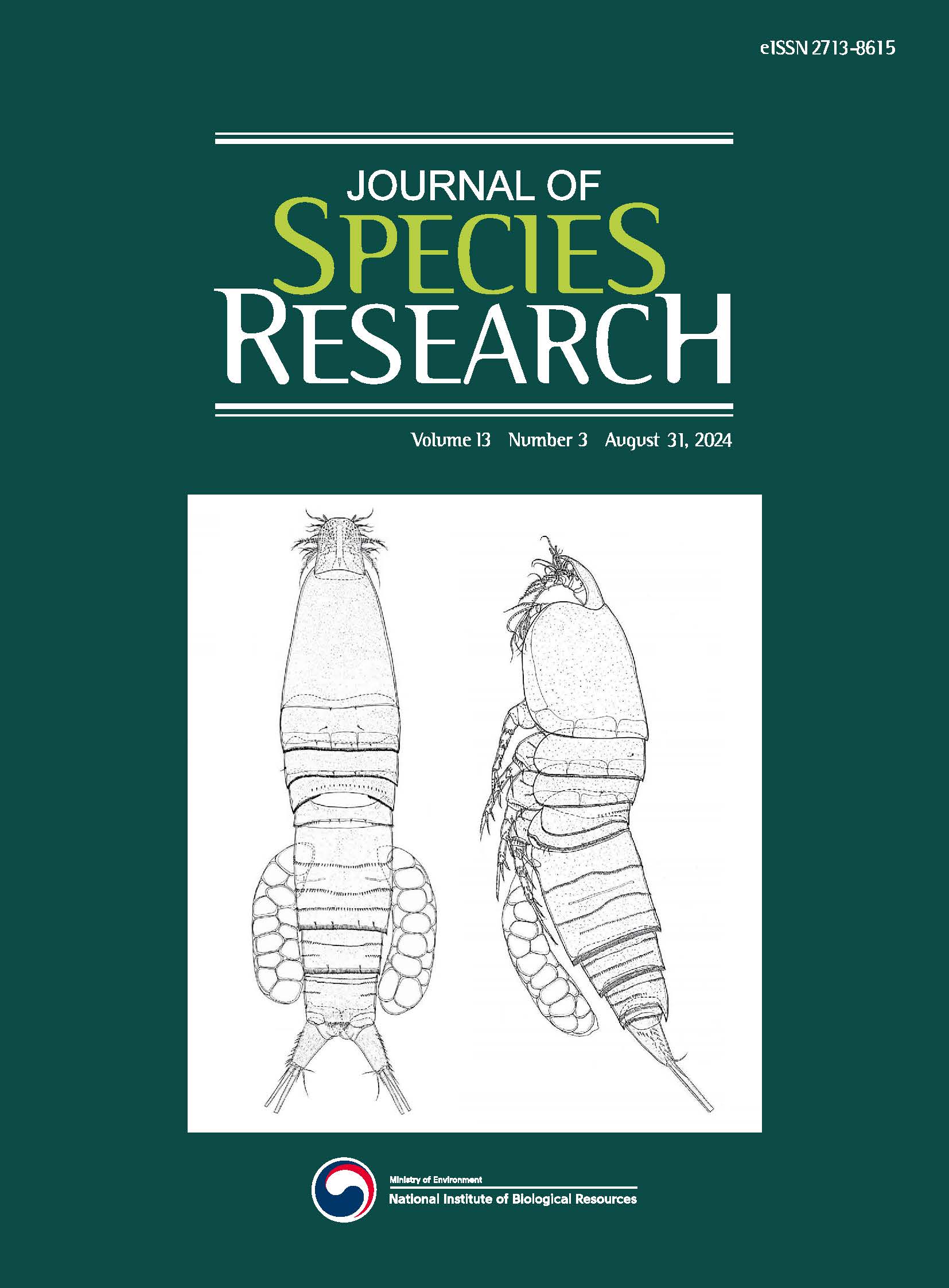- KOREAN
- E-ISSN2713-8615
- KCI
 E-ISSN : 2713-8615
E-ISSN : 2713-8615
One new species and one new record of lymantriine moths (Lepidoptera: Erebidae: Lymantriinae) in Korea
Sei-Woong Choi
(Research Institute for East Asian Environment and Biology)
Abstract
Herein, we report a new record of Arna bipunctapex (Hampson) and a new species, Euproctis fulvatus sp. nov. in Korea; both are Lymantriine moths. Arna bipunctapex is distinguished by a relatively large wingspan with two black dots and a small dot between these black dots in the apical region of a yellowish forewing. The male genitalia of A. bipunctapex can be distinguished by the lack of a process on the sacculus of valva while the female genitalia can be distinguished by an antrum that is basally flat with two lateral digitate arms. Euproctis fulvatus is distinguished by yellowish wings with a medially curved central fascia of the forewing. The male genitalia can be distinguished by the bifid, digitate uncus and the simple, square-shaped valva with a distal strong invaginated margin. The female genitalia can be distinguished by the long, medially twisted, ductus dursae with simple antrum posteriorly strongly sclerotized and ovate corpus bursae without signum. Larvae of E. fulvatus are distinguished by a black head with a pair of long, black, lateral tufts, dorsum with 10-11 white intersegmental dots and bright red setal warts on T2-A8, and bright red glands on A6 and A7.
- keywords
- Erebidae, Korea, Lepidoptera, Lymantriinae, taxonomy
Reference
Collenette, C.L. 1932. The Lymantriidae of the Malay Peninsula. Novitates Zoologicae 38:49-102.
Folmer, O., M. Black, W. Hoeh, R. Lutz and R. Vrijenhoek. 1994. DNA primers for amplification of mitochondrial cytochrome c oxidase subunit Ⅰ from diverse metazoan invertebrates. Molecular Marine Biology and Biotechnology 3:294-299.
Hampson, G.F. 1891. Illustrations of typical specimens of Lepidoptera Heterocera in the collection of the British Museum. Part VIII- The Lepidoptera Heterocera of the Nilgiri District. London. P. 57, pl. 140, f. 13.
Holloway, J.D. 1999. The Moths of Borneo [Part 5]: Family Lymantriidae. Malayan Nature Journal 53:1-188.
Kim, S.S., S.W. Choi, V. Kononenko, A. Schintlmeister and J.C. Sohn. 2016. Revised list of the Korean Noctuoidea based on latest classification. Entomological Research Bulletin 32:138-160.
Kirby, W.F. 1892. A synonymic catalogue of Lepidoptera Heterocera (moths). Sphinges and Bombyces. Gurney &Jackson, London Volume 1. pp. 1-951.
Kitching, I.J. and J.E. Rawlins. 1998. The Noctuoidea. In:N.P. Kristensen (ed.), Handbook of Zoology/Handbuch der Zoologie, Lepidoptera, Moths and Butterflies, Vol. 1. Evolution, Systematics and Biogeography. W. de Gruyter, Berlin. pp. 355-401.
Lafontaine, J.D. and M. Fibiger. 2006. Revised higher classification of the Noctuoidae (Lepidoptera). The Canadian Entomologist 138:610-635.
Ratnasingham, S. and P.D.N. Hebert. 2007. BOLD: the barcode of life data system (www.barcodinglife.org). Molecular Ecology Notes 7:355-364.
Swinhoe, C. 1892. Catalogue of eastern and Australian Lepidoptera Heterocera in the collection of the Oxford University Museum. Part 1 Sphinges and Bombyces. Claredon Press, Oxford, 324 pp.
Swinhoe, C. 1922. A revision of the genera of the family Liparidae. Annals and Magazine of Natural History 10(9):449-484.
Wagner, D.L. 2005. Caterpillars of Eastern North America. Princeton University Press, Princeton.
Wang, H.S., X.L. Fan and M. Wang. 2010. A New Record of Euproctis wilemani (Lepidoptera: Lymantriidae) from Hainan Island. Florida Entomologist 93(2):325-326.
Wang, H.S., M. Wang and X.L. Fan. 2011. Notes on the tribe Nygmiini (Lepidoptera: Erebidae: Lymantriinae) from Nanling National Nature Reserve, with description of a new species. Zootaxa 2887:57-68.
Zahiri, R., I.J. Kitching, J.D. Lafontaine, M. Mutanen, L. Kaila, J.D. Holloway and N. Wahlberg. 2010. A new molecular phylogeny offers hope for a stable family level classification of the Noctuoidea (Lepidoptera). Zoologica Scripta 40:158-173.
- Downloaded
- Viewed
- 0KCI Citations
- 0WOS Citations

